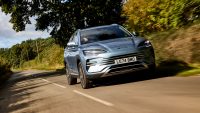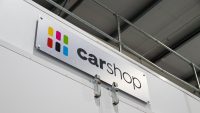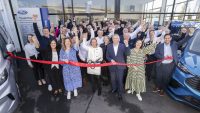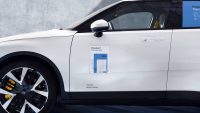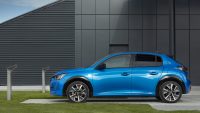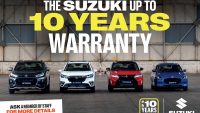 AS the world’s press gathered for the unveiling of Nissan’s new electric Leaf model, the car firm’s executives in territories around the world were still trying to work out how its dealers would make money out of the car.
AS the world’s press gathered for the unveiling of Nissan’s new electric Leaf model, the car firm’s executives in territories around the world were still trying to work out how its dealers would make money out of the car.
In fact, even now, the car manufacturer is devising a plan for its UK dealer network to keep profitability levels up when the Leaf finally hits our shores at the end of 2011. Ok, so the firm has got a bit of time to sort out the commercials, but what’s the problem?
Well, electric cars will need far fewer check-ups in the conventional sense – oil and filter changes will be replaced with the need for battery replacements – so dealers will be seeing customers far less, losing the chance for up-sales.
And then there’s the problem with batteries – these units are hugely expensive and carmakers are still working out whether they’ll be leased or sold to customers.
‘We think zero emissions vehicles, in terms of volume, will grow aggressively over the next 10 years,’ Nissan UK managing director Paul Willcox explains. ‘We don’t see electric as a stepping stone – we see it as the future.
‘But we are still to decide how the distribution of EV via our network will work. We know it will be regionally based and we need to structure the network to support the roll out.
‘We know we have to make sure that this is a positive opportunity for the network in terms of attracting more customers and generating more profit. And in terms of this we are still ironing out the firm details. We would be stupid to create a business model that alienates our dealers and are confident the one we devise will be sustainable one for the network.
‘But it’s true we also need to think about how we manage the packaging of the batteries. Will people buy them or lease them? That’s something we don’t know yet, but our intention is to make sure the cost of ownership is comparable with an internal combustion engine.’
Nissan’s step into electric vehicles is a bold move – especially as not everyone is convinced it’s the future. There are some corners of the industry that backs hydrogen fuel cells and others that are concentrating on making
conventional combustion engines as efficient as possible. But not Nissan – Willcox says the brand is fully behind EVs.
‘We think electric vehicle technology is the way forward,’ he explains. ‘That’s why we’ve made a big statement in terms of the investment we’ve made and we are committed to bringing it to the UK. We think it’s the right time for electric cars, especially for Europe and the UK. We are putting a huge emphasis on this – and don’t see it as a bridge to anything else – we see it as the next step.
‘Some would say that’s a big gamble, and I guess in many respects it is, but with the product we’re bringing it forward in – a compact hatchback – I think it will be a very usable product.
‘It’s not a Micra, it’s a fully fledged five seater, five door hatch and when the vehicle is launched it will be useful. It will have 160km range and it will have the performance drivers are used to – you will be able to break the speed limit in it, not something we advocate, but you will be able to.’
SHARP END
 Willcox says the Nissan dealer network will be at the forefront of rolling this technology out and it’ll be those retailers close to the large conurbations, such as London and Manchester – traditional commuting cities – where dealers will be called upon first.
Willcox says the Nissan dealer network will be at the forefront of rolling this technology out and it’ll be those retailers close to the large conurbations, such as London and Manchester – traditional commuting cities – where dealers will be called upon first.
‘We think the demand will probably grow in areas where financially it probably makes more sense. So if you can avoid the congestion charge by using an EV then chances are London will be one of the largest markets,’ says Willcox.
‘Dealers are very positive about the technology.At the end of the year we will sit down and explain to the network what the business model is. We are still working on that. But they are very enthusiastic about Leaf and our commitment to EVs. They can see that if we’re leading in this field it will do a lot for growing our credibility in the market.’
Willcox has recently returned to Nissan UK after a period of spearheading the brand’s marketing in Europe and one of his main objectives has been to bring stability to the UK set-up.
Nissan has been through varying restructuring programs every three to four years for more than a decade and one of his first tasks was to establish a better relationship with the brand’s 184 UK dealers – and to sort out some problem areas.
‘We have a bedrock of good performers; 60 per cent of our dealers do an excellent job. But we have over-complicated things in the past,’ explains Willcox. ‘We have taken a bold step to try and make things more simple and that’s also in the way we evaluate our partners.
‘In the past we had 100 KPIs as to what made a good dealer and what didn’t. We threw them out of the window a year ago and now have a very simple view: A good business partner has to satisfy three things.
‘It has to deliver an acceptable level of retail sales performance; high level of customer quality in terms of sales and aftersales; and have an open win-win relationship with Nissan. If they satisfy those three things then we’ll have a fantastic working relationship.
‘If they don’t, well, then we have a problem. And that’s something we will address. In the past we’ve been less than convincing in our approach to our dealers but we will not tolerate a lack of commitment or under achievement in any of those three key areas.’
Willcox says he can split the underperforming 40 per cent of dealers into two distinct categories: The new ones, and the real problem ones.
‘It takes a while to reach good representation as a new dealer – we reckon 4-5 years before they really get up and running – so I’m confident that 20 per cent will come on in the way we expect,’ he explains.
‘It’s the other 20 per cent that are consistently underperforming which we have to address and we’ve got a program in place to address this.’
 Willcox tells us that those three core performance indicators are designed to cut the wheat from the chaff. Margin structures have been designed around those core guidelines – so dealers that don’t come up to scratch can’t survive.
Willcox tells us that those three core performance indicators are designed to cut the wheat from the chaff. Margin structures have been designed around those core guidelines – so dealers that don’t come up to scratch can’t survive.
‘We’ve increased our margins and put an emphasis on quality. Three per cent of a dealer’s margin is now based on acceptable levels of sales satisfaction – if you don’t achieve it you don’t get your margin. Dealers can’t stay in
business if they don’t get that margin so they have do something about their quality.
‘The remainder of the margin is on retail sales performance. This means dealers that deliver here will have a very profitable performance with Nissan. Equally it means that dealers that don’t start performing will become unviable.’
OFFICE ANGELS
That’s not to say Nissan isn’t prepared to help its network. The manufacturer has a team of business support managers that can help dealers perform. These ‘office angels’ were put in place around the same time as the market collapsed too, so have been instrumental in helping Nissan franchise holders survive the downturn.
‘We are very happy with the shape and size of our network,’ added Willcox. ‘We have 184 dealers and 85-90 partners with a very balanced mix between PLC and owner drivers.
‘It’s the bottom 20 per cent that we are concerned about. For those that we feel can’t make up the performance deficit we’ve already begun to issue termination notices. Around 15 of our dealer points in the last three months have been issued these.’
So, for those dealers that remain on board, what would Willcox’s number one piece of advice be for a successful future?
‘Don’t overreact,’ he says bluntly. ‘At the end of last year the whole industry’s reaction to used cars lost everybody a lot of money. There was panic, huge panic, and the lemming stampede to get rid of used cars meant everyone was
rushing back to buy them again six weeks later at a premium. It’s easy for me to say, and difficult to do, but I would say dealers need to keep calm and not overreact to situations.’
He adds keeping an open relationship with the manufacturer you represent is equally key.
‘We’re here to support our dealers, not force them out, so the sooner an issue is identified the sooner we can look at it,’ he says. ‘If you keep your head down, you can go down.’
That support certainly seems to have had the desired effect – Willcox explains the marque has lost very few dealers in the credit crunch.
‘Our industry’s ability to adapt, especially at Nissan, has really surprised me. This has certainly been the toughest recession I can remember,’ he says. ‘But we’ve managed to grow our share at a time the industry has been hit, somewhat bizarrely. I say bizarrely because our network profitability to the end of June is at record levels – 1.7 per cent return on sales. Our network is doing well.’
And things are looking positive for the future too, says Willcox, with some extremely exciting product launches. ‘We have got a big investment in products coming,’ he explained.
‘Next year we have a new Micra, which will be important for us, but I’m most excited about the Qazana – it’ll be built in Sunderland and that car will be very unique in the marketplace. At a time when the industry is under pressure, Nissan has maintained its investment in new models – dealers should be confident about the future.’
by JAMES BAGGOTT










